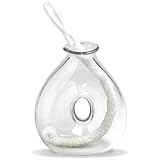2009 - Wine Industry-
Why choose organic wine?
What could be a better accompaniment to a meal of organic food than a glass of organic wine? Wine is one of humanity's oldest beverages. It's been used in medicine and religious rituals, and it is all over our social calendars. A lot of research has been made to study its effect on human health. Is it a coincidence that the French, who are second in the world in wine consumption, also have the second lowest occurrence of heart disease?
That alone is a good reason to enjoy a glass of wine. But why select an organic wine over one made with conventional methods?
First, as with all organic food, organic wine is produced without any pesticides, herbicides or insecticides. According to some estimates, seventeen such substances are used in conventional wine grape production, making grapes one of the most heavily sprayed crops. After years of spraying the soil, as well as a season of spraying the grapes, the grapes contain contact as well as systemic pesticides. They may not only harm the plants, the soil, and ultimately the environment, but may also be present in the wine as a residue.
Organic farming promotes "biodiversity" and allows other plants to grow in and around the vineyard. Instead of using chemical substances to eliminate weeds, vintners let them grow. In place of herbicides they cultivate the soil and plant cover crops. They use only natural fertilizers, such as composted animal manure, and cultivate beneficial insects, such as ladybugs, to keep the less-welcome ones away.
Grapes are hand picked, which allow only the ripest and healthiest to be used in wine production. An independent body of certification (accredited by the USDA), has to control each winegrower, once or twice a year, to test if he meets the standards for organic farming.
But being "organic" doesn't stop when the grapes are picked. The winemaking process itself is a factor. Organic wineries keep physical treatment of the wine to a minimum level, although the temperature is controlled throughout.
Further, to call a wine "organic," it must not contain added sulfur dioxide, or sulfites. A natural byproduct of the fermentation process, sulfites are essential to prevent oxidation or bacterial spoilage of the wine. While the U.S. Department of Agriculture allows organic wines contain up to 100ppm of sulfites in the final product, many contain less than that; organic red wine, for example, often contains only 40ppm. Conventional winemakers generally add sulfites, and the sulfite levels of their wines will be twice as high.
Organic wines haven't had a good reputation throughout the years, but you'd be surprised at how far they've come. Add a glass of organic wine to that next organic meal, and make it tasty, heart-healthy, and environmentally friendly.
About the Author
Debbie O'Meara is the owner of www.organic-food-and-drink.com, full of resources and information about organic food and beverages, including wine.
Thoughts about Wine Industry
Wine Storage Options for Serious Wine Collectors
Wine asset management, as serious wine collecting and storage has come to be known, is available in a variety of configurations depending on what a wi...
Click Here to Read More About Wine ...
Tesco Wine festival launched with up to 50% off a wide range of wines
At Tesco providing customers with quality wine at affordable prices has always been a priority, and from now until the first week of October, customer...
Click Here to Read More About Wine ...
Recommended Wine Industry Items
WINE TALL VINA 10.25Z, CS 1/DZ, 08-1360 LIBBEY GLASS, INC. GLASSWARE
Wine Decanter Washing Brush
 Soft, flexible foam wand reaches every corner to clean decanters & ready them for the next bottle.
Soft, flexible foam wand reaches every corner to clean decanters & ready them for the next bottle.
Customer Review: PERFECT for cleaning the decanter
The wand bends to get around in the crevices of the decanter. I would recommend this brush!
Customer Review: Great product
I bought this as a gift for my dad and have used it several times in his decanter (as shown on the advert). I have found the brush to be exceptional. It easily bends to the contour of the decanter while staying put when exerting some pressure for the cleaning. He has been very happy with the brush as well.
More product information
Iron Wine
Tags: Wine Tasting,Uk | Wine Terminology
Labels: Uk, Wine Tasting
&type=page">














